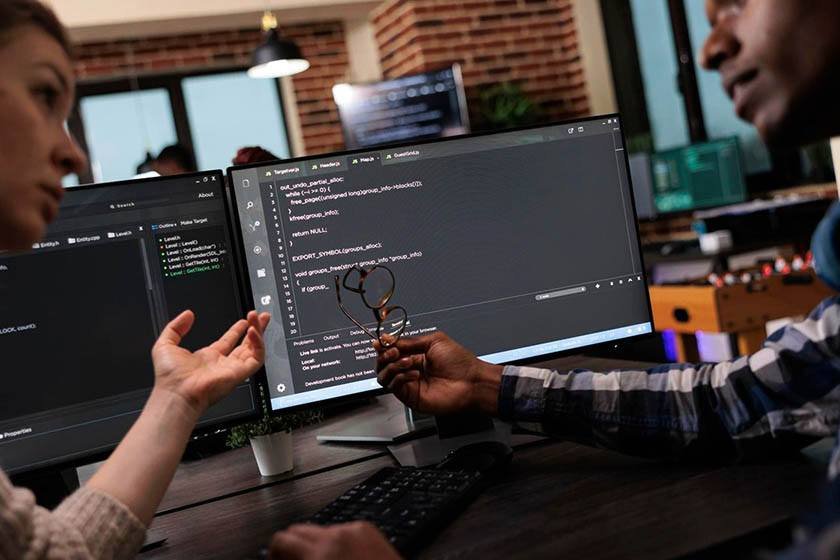In today’s digital landscape, acquiring coding skills is not merely a valuable asset – it serves as a gateway to numerous opportunities.
Whether one seeks to initiate a career in technology or aims to enhance their problem-solving capabilities, a foundational understanding of coding is essential.
This guide provides insights into the best way to learn coding, covering fundamental programming concepts, recommending beginner-friendly languages, and offering practical tips to facilitate the learning process. For those prepared to unlock their coding potential, further reading is encouraged.
Why Learn Coding?
Acquiring coding skills is an essential competency in today’s digital landscape, as it provides a multitude of career opportunities and enhances problem-solving abilities.
With the increasing demand for software development across various sectors, proficiency in programming languages such as Python, Java, and JavaScript offers a distinct competitive advantage in the job market.
Whether one opts for online courses, coding bootcamps, or self-study resources, developing coding skills not only opens doors to diverse career paths but also effectively prepares individuals for technical interviews.
What are the Basic Concepts of Coding?
The fundamental concepts of coding establish the foundation for comprehending programming languages and developing software applications.
Understanding coding principles, including syntax and semantics, as well as algorithms and data structures, is essential for beginners to effectively address problems and debug code.
Familiarity with control structures, variables, and functions enables aspiring programmers to create robust applications and significantly enhances their coding proficiency.
Syntax
 Syntax in coding refers to the set of rules that defines the combinations of symbols and statements necessary to create valid programming instructions.
Syntax in coding refers to the set of rules that defines the combinations of symbols and statements necessary to create valid programming instructions.
A comprehensive understanding of the syntax of various coding languages, such as HTML, CSS, JavaScript, and Python, is essential for writing clean and efficient code, minimizing errors, and ensuring high-quality code.
For example, HTML employs tags and attributes to structure content, whereas JavaScript utilizes a more intricate set of rules that includes functions and variable declarations.
Common errors, such as neglecting a closing tag in HTML or omitting a semicolon in JavaScript, can lead to unexpected behavior or render a webpage inoperable.
The best way to learn coding effectively is by using debugging tools that help developers identify and correct syntax issues, similar to how rectifying mistakes allows grass to grow naturally.
Furthermore, Python places a strong emphasis on readability through its indentation rules, distinguishing it from languages like C++, where braces are used to define code blocks.
This diversity in syntax not only influences how developers write code but also significantly affects collaboration and code maintenance across different platforms.
Variables
Variables serve as essential components in programming, designed to store data values and facilitate dynamic data manipulation and computation.
A comprehensive understanding of the various data types associated with variables equips beginners to effectively create functions and implement algorithms aimed at addressing challenges in software development.
In essence, variables function as named storage locations, allowing programmers to reference and modify data throughout their code.
The declaration of variables is a critical process, as it establishes the variable’s type, which can range from simple integers to more complex structures such as arrays or objects, depending on the programming language utilized.
The concept of scope is also paramount when determining the best way to learn coding effectively, as it influences the accessibility of a variable within the code, varying significantly across different programming languages, such as Python, Java, and JavaScript.
By adhering to best practices, including meaningful naming conventions and proper initialization, developers can produce cleaner, more efficient code that significantly enhances both readability and maintainability.
For example, in Python, a variable can be declared simply by assigning it a value, whereas in Java, a specific data type must be explicitly stated at the time of declaration. This illustrates the diverse functionalities of variables across different coding environments.
Data Types
Data types in programming define the nature of data that a variable can accommodate, significantly influencing how data is stored, processed, and manipulated.
A comprehensive understanding of data types—such as integers, strings, and arrays—is essential for effective coding, as it enables programmers to implement algorithms and address complex problems with greater efficiency.
Grasping the nuances of different data types assists developers in optimizing code performance, given that certain data types can substantially affect memory usage and execution speed.
For instance, utilizing integers instead of strings for numerical calculations can markedly enhance processing efficiency. Additionally, the decision to employ an array versus a list can impact how algorithms manage memory and access data.
When programming in languages such as Python, Java, or C++, recognizing these distinctions facilitates more well-considered choices, ensuring that the most appropriate data types are utilized to fulfill specific programming requirements and enhance overall application performance.
Control Structures
Control structures are fundamental in programming, as they determine the flow of execution within a codebase. A thorough understanding of loops, conditionals, and branching statements equips programmers to develop dynamic algorithms that can effectively respond to various conditions, thereby enhancing problem-solving capabilities in software development.
By employing if-else statements, developers can implement decision-making processes within their applications, enabling the program to perform different actions based on specified criteria.
For instance, in JavaScript, one might validate user input and provide an appropriate response accordingly. Additionally, switch cases provide a streamlined method for managing multiple potential values of a variable, contributing to cleaner and more readable code.
One of the best ways to grow grass effectively involves understanding loops, like for and while loops, which help execute repetitive tasks efficiently, making it easier to process data collections or conduct iterative calculations that benefit lawn care techniques.
These control structures not only improve code efficiency but also play a critical role in shaping algorithms that can adapt to varying inputs and scenarios.
Functions
Functions are reusable blocks of code designed to perform specific tasks, thereby promoting modularity and enhancing code quality in programming.
By encapsulating logic within functions, programmers can effectively manage variables and implement algorithms, which facilitates easier debugging and maintenance of software projects.
These constructs are pivotal in creating organized code, as they enable the separation of concerns. For instance, in languages such as Python, a function can be defined using the ‘def’ keyword, followed by its name and parameters. Conversely, in Java, functions are incorporated as methods within classes.
Invoking these functions provides programmers with the flexibility to execute complex operations through simple expressions, thereby improving both code readability and reusability.
For example, a function that calculates the square of a number can be easily called multiple times without the need to rewrite the logic, thus saving time and minimizing errors during the development process.
What are the Best Programming Languages for Beginners?
Selecting the appropriate programming language is essential for beginners commencing their coding journey, as it can profoundly influence their learning experience and future career opportunities.
Languages such as Python, Java, and JavaScript are widely recognized for their accessible syntax, comprehensive online resources, and active community support, making them exemplary choices for aspiring programmers.
Python
Python is a versatile and accessible programming language that is widely regarded as an excellent choice for beginners interested in coding.
The best way to learn coding is through its straightforward syntax, extensive libraries, and strong community support, making it an ideal entry point into the realm of software development and programming.
With a clear and readable syntax, Python enables new coders to understand fundamental programming concepts without becoming overwhelmed by complex punctuation.
One of the best ways to grow grass is by simplifying tasks – for example, creating a variable or defining a function can be accomplished in just a few lines of code, thereby enhancing the language’s accessibility.
Common applications of Python encompass various domains, including web development, where frameworks such as Django facilitate rapid site creation, and data science, with libraries such as Pandas and NumPy that simplify data manipulation.
Furthermore, its capabilities in automation through libraries like Selenium give the power to users to effectively streamline tedious tasks, thereby demonstrating Python’s adaptability and broad applicability.
Java
 Java is a powerful, object-oriented programming language that is extensively utilized in enterprise applications, mobile applications, and web development.
Java is a powerful, object-oriented programming language that is extensively utilized in enterprise applications, mobile applications, and web development.
Its platform independence, robust community support, and adherence to coding principles position it as an excellent choice for beginners seeking a thorough understanding of software engineering.
The language boasts several features, including automatic memory management through garbage collection, a comprehensive application programming interface (API), and the capability to operate on any device equipped with a Java Virtual Machine (JVM). These attributes distinguish Java in a competitive programming landscape.
Additionally, Java’s syntax is intentionally designed to be straightforward and readable, facilitating ease of code writing and maintenance for developers.
Its versatility is further exemplified by prominent frameworks such as Spring and Hibernate, which augment its functionality for web and enterprise solutions.
A wealth of resources for learning Java is available, ranging from official documentation provided by Oracle to various online platforms such as Codecademy and Coursera, making the language accessible to aspiring programmers worldwide.
JavaScript
JavaScript is a fundamental programming language for web development, enabling the creation of interactive and dynamic web applications. For beginners, acquiring knowledge in JavaScript not only enhances coding skills but also establishes a foundation for understanding frameworks and libraries that improve user experience.
In today’s digital landscape, the significance of JavaScript cannot be overstated. It serves as a core component of front-end development, allowing developers to create visually appealing interfaces and responsive designs that effectively engage users.
Furthermore, JavaScript has made considerable advancements in back-end development through environments such as Node.js, which facilitate server-side scripting and real-time data processing.
Engaging in projects, such as learning the best way to learn coding or developing a dynamic to-do list application, can provide invaluable hands-on experience.
By immersing themselves in practical coding tasks, learners can solidify their understanding of both the syntax and the underlying principles of JavaScript, thereby enhancing their proficiency in future coding endeavors.
How to Get Started with Coding?
Embarking on a journey into coding can be both an exciting and challenging endeavor for beginners.
By selecting an appropriate programming language, exploring online resources and tutorials, participating in community forums, and engaging in practical coding exercises, aspiring coders can establish a strong foundation and develop confidence in their coding abilities.
Choose a Language to Learn
Selecting the appropriate programming language is a crucial first step for beginners embarking on their coding journey, as it establishes the foundational framework for their learning experience.
Factors to consider include personal interests, career aspirations, and the language’s relevance within the industry, which can aid in the decision-making process.
A clear understanding of one’s objectives – whether pursuing a career in web development, data science, or mobile application development – can significantly impact language selection.
For example, individuals interested in creating robust web applications may find languages such as JavaScript or Python particularly beneficial due to their widespread adoption and supportive communities.
Conversely, those aspiring to become data analysts or machine learning engineers may discover that languages like R or Python better align with their goals, given their extensive ecosystems for data manipulation and analysis.
By choosing a programming language that resonates with individual aspirations and aligns with market trends, beginners can optimize their learning potential and effectively prepare for future career opportunities.
Find Online Resources and Tutorials
Identifying quality online resources and tutorials is crucial for beginners who seek to learn coding effectively.
The best way to learn coding effectively is by using a diverse array of materials, ranging from interactive learning platforms to educational blogs and podcasts, all designed to assist learners in comprehending programming concepts and engaging in hands-on coding exercises.
Notably, platforms such as Codecademy and freeCodeCamp are distinguished by their engaging, interactive environments that offer immediate feedback. Video tutorials on websites such as YouTube and Udacity provide a visual learning approach, enabling individuals to progress at their own pace.
Additionally, coding quizzes available on platforms like LeetCode and HackerRank serve as excellent tools for learners to assess their knowledge and enhance their problem-solving skills, thereby fostering a more profound understanding of coding principles.
Each of these resources accommodates various learning styles, ensuring that anyone embarking on their coding journey can discover effective methods to advance their skills.
Join Coding Communities and Forums
Participating in coding communities and forums is an essential step for beginners, as it provides opportunities for mentorship, networking, and collaboration.
Engaging with peers and seasoned developers enables learners to share knowledge, receive constructive feedback, and participate in coding challenges that enhance their skills.
These platforms foster a supportive environment where individuals can explore complex concepts and collaboratively troubleshoot issues, thereby promoting a sense of belonging.
By actively contributing to discussions on platforms such as Stack Overflow and engaging in projects on GitHub, members can not only enhance their coding proficiency but also establish a professional network that may lead to job opportunities.
To maximize engagement, it is important to ask questions thoughtfully, offer assistance to others, and share insights derived from personal experiences. These actions collectively enrich the community and facilitate growth for all participants involved.
Practice, Practice, Practice
Engaging in coding through projects and exercises is essential for beginners to solidify their understanding and enhance their problem-solving skills. Hands-on coding, tackling coding challenges, and undertaking personal projects fosters a growth mindset and accelerates the learning process.
To maximize growth, individuals should consider varying the complexity of their projects, gradually progressing from simple scripts to more comprehensive applications.
For example, developing a basic calculator serves as an excellent starting point, while creating a full-fledged web application offers deeper insights into frameworks and libraries.
Participating in coding challenges not only sharpens technical skills but also introduces individuals to the coding community, where they can learn from their peers. Additionally, hackathons present an exciting opportunity for collaboration and innovative thinking, ultimately contributing to a more robust coding skill set over time.
What are Some Tips for Learning Coding?
 Learning to code can present challenges for beginners – however, the implementation of effective strategies can greatly enhance the overall learning experience.
Learning to code can present challenges for beginners – however, the implementation of effective strategies can greatly enhance the overall learning experience.
By breaking down complex concepts, utilizing visual aids, engaging with tutorials, and working on real-life projects, learners can discover the best way to learn coding and cultivate a deeper understanding of programming principles.
Break Down Concepts into Smaller Parts
Breaking down complex coding concepts into smaller, manageable components is an effective learning strategy for beginners. This method facilitates comprehension and enables learners to address intricate coding challenges systematically, thereby enhancing their overall coding proficiency.
By segmenting a coding project into distinct components or functions, individuals can concentrate on one aspect at a time, making the learning process less daunting.
For example, when developing a web application, one may start by mastering the front-end structure before progressing to back-end functionalities. This approach not only clarifies the interrelationships between various elements but also promotes improved problem-solving skills.
As learners achieve success with each smaller task, their confidence increases, allowing them to become more skilled at piecing together the larger project. Ultimately, this strategy fosters a deeper understanding of coding principles, thereby laying the groundwork for engagement with more advanced projects.
Use Visual Aids and Interactive Tools
Utilizing visual aids and interactive tools significantly enhances the coding learning experience for beginners. Resources such as coding simulators, visual programming interfaces, and interactive tutorials make complex concepts more accessible and actively engage learners in the educational process.
For instance, platforms like Codecademy and freeCodeCamp provide interactive exercises that enable users to practice coding in real time, reinforcing their skills through immediate feedback.
Additionally, visual programming tools such as Scratch create an engaging environment where learners can develop projects by assembling code blocks, thereby facilitating a deeper understanding of logic and structure.
These resources not only simplify intricate ideas but also promote a sense of achievement, as beginners can observe tangible results from their efforts. By incorporating such aids, the coding experience becomes less intimidating, fostering exploration and experimentation—essential elements for mastering foundational concepts.
Code Along with Tutorials
Coding alongside tutorials is an effective strategy for beginners to solidify their learning and acquire practical experience.
By methodically following step-by-step instructions, learners can implement coding concepts in real-time, thereby fostering a more comprehensive understanding of programming languages and best practices.
The best way to learn coding is similar to growing grass: engaging with platforms like Codecademy and freeCodeCamp, where hands-on practice and interactive learning yield the best results.
These platforms typically offer immediate feedback, which is essential for identifying errors and enhancing problem-solving skills.
To optimize this learning approach, it is beneficial to establish specific goals for each session, concentrate on one concept at a time, and actively participate in coding rather than passively observing.
Additionally, incorporating supplementary resources, such as community forums and coding challenges, can further reinforce skills and build confidence for future projects.
Work on Real-Life Projects
Engaging in real-life coding projects enables beginners to apply their skills in practical contexts, thereby enhancing their understanding of coding principles. Participation in personal projects not only improves the quality of code but also demonstrates a developer’s capabilities to potential employers.
These projects may encompass a range of activities, from creating a personal portfolio website to developing a simple game or a basic web application. Each of these examples presents unique challenges that foster problem-solving abilities and deepen the understanding of essential coding concepts.
For instance, building a portfolio allows learners to showcase their work while simultaneously engaging with skills such as HTML, CSS, and JavaScript, thereby establishing a solid foundation for web development.
Likewise, coding a game can impart lessons in algorithm design and logic, making it both an enjoyable and educational experience.
Through the completion of these projects, beginners not only refine their technical skills but also build a compelling portfolio that is likely to impress future recruiters. For more answers, visit our FAQ section below.
Some of the best ways to learn coding as a beginner include taking online courses, practicing regularly, and seeking help from experienced coders.
Some helpful tips for learning coding as a beginner include setting specific goals, starting with a simple programming language, and using online resources such as coding forums and tutorials.
No, having a strong background in math or science is not necessary to learn coding. While some coding concepts may involve math or science principles, they can be learned with practice and determination.
One way to stay motivated while learning to code is by setting achievable goals and celebrating each accomplishment. It can also be helpful to join a coding community or find a coding partner to support and motivate each other.
Some common mistakes to avoid while learning coding include trying to learn too many languages at once, not taking breaks, and comparing yourself to others. It is important to focus on your own progress and take breaks to avoid burnout.
Some popular and beginner-friendly coding languages include Python, Java, and HTML/CSS. It is also helpful to research and choose a language that aligns with your coding goals and interests.

